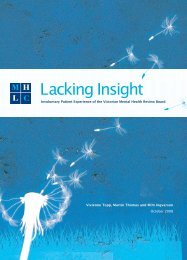Reducing Ethnic Profiling in the European Union - Open Society ...
Reducing Ethnic Profiling in the European Union - Open Society ...
Reducing Ethnic Profiling in the European Union - Open Society ...
- No tags were found...
Create successful ePaper yourself
Turn your PDF publications into a flip-book with our unique Google optimized e-Paper software.
Enhanc<strong>in</strong>g Accountability Through Transparency andInformation CampaignsThe general public has an important role to play <strong>in</strong> monitor<strong>in</strong>g ethnic profil<strong>in</strong>g andhold<strong>in</strong>g law enforcement agencies accountable for compliance with non-discrim<strong>in</strong>ationstandards. At <strong>the</strong> same time, it is <strong>in</strong> <strong>the</strong> <strong>in</strong>terest of law enforcement to deepen <strong>the</strong>irconnections with local communities and ensure that residents understand some basicaspects of polic<strong>in</strong>g and its role <strong>in</strong> ensur<strong>in</strong>g public safety. For this, civilians must be awareof <strong>the</strong>ir rights and responsibilities <strong>in</strong> encounters with law enforcement and have channelsthrough which to obta<strong>in</strong> <strong>in</strong>formation, voice concerns, provide feedback, and seek redress.Chapter IV of this book discussed formal mechanisms for civilian <strong>in</strong>volvement, such asoversight bodies and compla<strong>in</strong>ts mechanisms. This section exam<strong>in</strong>es a range of <strong>in</strong>formalor semi-formal actions that enhance community engagement and police accountability,<strong>in</strong>clud<strong>in</strong>g targeted <strong>in</strong>formation campaigns and actions such as “ride-alongs” that <strong>in</strong>creasepolice-citizen contacts and emphasize openness and quality of service.The general public frequently has little knowledge of—and many misconceptionsabout—law enforcement. It is particularly important to provide immigrant communities—someof whose members may come from countries where polic<strong>in</strong>g is violent,unaccountable, or used as a tool of political oppression—with <strong>in</strong>formation on <strong>the</strong>irrights and responsibilities <strong>in</strong> relation to law enforcement. The <strong>in</strong>formation must beprovided <strong>in</strong> accessible languages. The “Police ESOL” language tra<strong>in</strong><strong>in</strong>g program devised<strong>in</strong> conjunction with <strong>the</strong> South Wales Police shows how <strong>the</strong> police can engage with peoplewho do not speak <strong>the</strong> national language. In communities with low literacy rates,written materials should be complemented with <strong>in</strong>formation on local television andradio. Information campaigns are particularly important when <strong>the</strong> police <strong>in</strong>troduce anew practice—for example, <strong>the</strong> us<strong>in</strong>g of stop forms—or undertake important operationswith widespread community impacts.A relatively simple means to support greater police-community communicationare <strong>the</strong> “know-your-rights” leaflets handed out to every person stopped by <strong>the</strong> police.In <strong>the</strong> United K<strong>in</strong>gdom, <strong>in</strong>formation about rights specific to stops and searches isavailable on <strong>the</strong> back of stop forms and widely-distributed leaflets. In o<strong>the</strong>r countries,leaflets have been developed by NGOs. These leaflets aim to <strong>in</strong>form residents aboutpolice powers and <strong>the</strong>ir rights and responsibilities when stopped by <strong>the</strong> police. Withouta basic understand<strong>in</strong>g of <strong>the</strong>se issues, <strong>in</strong>dividuals have no basis for know<strong>in</strong>g whe<strong>the</strong>ran officer’s conduct is appropriate and lawful. Know your rights leaflets should always<strong>in</strong>clude <strong>in</strong>formation on how to make a compla<strong>in</strong>t <strong>in</strong> cases of misconduct or abuse.The three case studies below show <strong>the</strong> variety of ways—<strong>in</strong> writ<strong>in</strong>g, video, andelectronically—<strong>the</strong> police <strong>in</strong> <strong>the</strong> UK convey <strong>in</strong>formation to members of <strong>the</strong> public about<strong>the</strong>ir rights.114 STRATEGIES FOR REDUCING ETHNIC DISPROPORTIONALITY
















